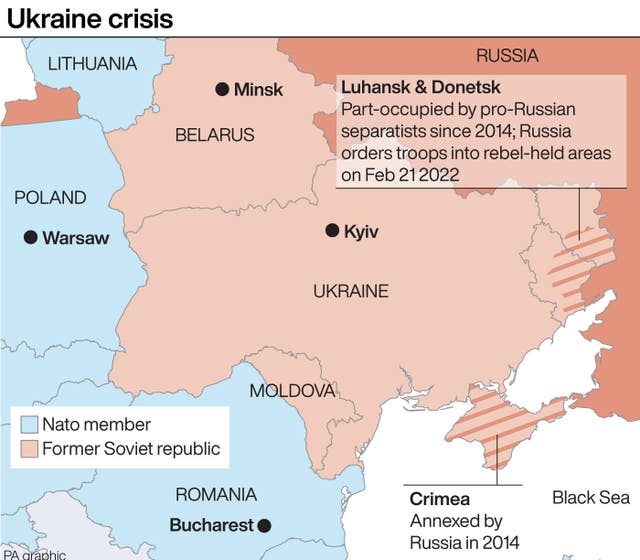
Ian Payne 4am - 7am
23 February 2022, 16:34

The sanctions are the first steps in a planned series of retaliatory measures.
European Union sanctions against Russia have taken effect, targeting senior government officials, several companies and hundreds of legislators who voted in favour of recognising the independence of separatist parts of south-east Ukraine.
The sanctions, mostly a freeze on the assets of those listed and a ban on them traveling in the 27-nation EU, are the first steps in a planned series of retaliatory measures designed to be ramped up if Russian President Vladimir Putin launches an attack or pushes troops deeper into Ukraine.
He signed a decree recognising Donetsk and Luhansk as independent and appears to be driving Russia’s campaign against Ukraine, but he is not on the EU’s list even though the sanctions target those “who were involved in the illegal decision”.

“The EU will extend restrictive measures to cover all the 351 members of the Russian State Duma, who voted on 15 February in favour of the appeal to President Putin to recognise the independence of the self-proclaimed Donetsk and Luhansk ‘republics’,” EU headquarters said.
A further “27 high-profile individuals and entities, who have played a role in undermining or threatening the territorial integrity, sovereignty and independence of Ukraine” – including government officials, banks, businesspeople and top military officers – are also in the EU’s sights.
The measures hit banks that finance Russia’s armed forces. They target the ability of Moscow to access EU capital and financial markets and services, and ban EU trade with the two regions so that “those responsible clearly feel the economic consequences of their illegal and aggressive actions”.
EU foreign policy chief Josep Borrell said the sanctions “will hurt Russia and it will hurt a lot”, but Pyotr Tolstoy, deputy chairman of the State Duma lower house of parliament, laughed them off and warned that Moscow would retaliate with its own measures.
“Every time they implement sanctions against Russia, it does not make any sense and it’s worthless,” he told Belgian broadcaster RTBF on Wednesday. “Actually, we don’t give a damn about these sanctions.
“It gives the impression that the authorities in Brussels are doing something. In fact, they are doing nothing.”
The measures come on top of a raft of economic and other sanctions slapped on Russia since it annexed Ukraine’s Crimean peninsula in 2014, including steps to constrain Moscow to comply with the 2015 Minsk peace deal, which ended major hostilities in eastern Ukraine but now appears to have been overtaken by events.
Those sanctions already targeted Russia’s financial, energy and defence sectors, as well as goods that can be used for civilian and military purposes.
More than 190 people and almost 50 “entities”, which are often organisations, agencies, banks or companies, had also been separately targeted by the bloc for “actively supporting actions and implementing policies that undermine or threaten the territorial integrity, sovereignty and independence of Ukraine”.
More than 14,000 people have been killed since 2014 in fighting between Ukrainian troops and Russian-backed separatists in eastern Ukraine.